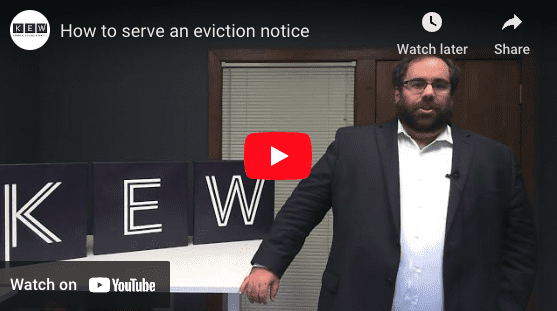Holiday Card Round Up
December 12, 2022

A round up of KEW holiday cards of years past.
Unlearn What You Have Learned: Wisconsin’s New LLC Law
October 25, 2022

In April 2022, Governor Evers Signed Wisconsin Act 258. This Act makes significant changes to the statutes for all forms of business entities – corporations, non-stock corporations, partnerships, limited partnerships and limited liability companies. This article will focus specifically on the
Can I Hold An Employee’s Paycheck?
August 22, 2022

Almost every employer has faced the following situation: an employee quits without notice, and still possesses property (uniforms, equipment, keys) that belong to the company. Or worse, the employee is disgruntled and damages property of the company on her way out.
EVICTED: Notices Needed To Terminate Residential Tenancy in Wisconsin
July 20, 2022

In this video, Attorney Jessica M. Kramer discusses how to terminate a residential tenancy, what type of notice to use, and provides answers to some commonly asked questions.
Do I Need To Provide Leave To My Employees?
June 21, 2022

First of all, when we say “leave” we are referring to leave as a general term of not being required to be at work. So, leave is an umbrella term that refers to vacation time, sick time, personal time, PTO and whatever other creative term may be used to refer to time away from work.
What is Litigation?
June 1, 2022

Attorney Nicholas C. Watt begins his litigation series with Part 1: What is Litigation?
How to Serve an Eviction Notice
May 10, 2022

How To Serve An Eviction Notice May 10, 2022 | Landlord Attorney Joe Andreoni discusses how to serve an eviction notice in Wisconsin. For more information about serving eviction notices, or other landlord and/or eviction questions, contact Kramer, Elkins & Watt, LLC at 608-709-7115 or info@kewlaw.com.
The Supreme Court Issues Opinions on Two Vaccination Mandates
January 17, 2022

The Supreme Court Issues Opinions on Two Vaccination Mandates:What Employers Need to Know January 17, 2022 | COVID | Employment On January 13, The Supreme Court of the United States issued two important decisions pertaining to vaccinations in the workplace. In one ruling, the Supreme Court struck down the Biden Administration’s OSHA rule requiring employers […]
PHMDC Renews County-Wide Mask Mandate
December 2, 2021

PHMDC Renews County-Wide Mask Mandate December 2, 2021 | COVID | Current Events Despite previously saying it had no plans to renew the mask mandate after a previous iteration expired on November 27, Public Health of Madison and Dane County (“PHMDC”) has issued a new mask mandate to run until January 3. Is this order the same as the […]
Five Days, Fourteen Days, and the Right to Cure: Notices to Terminate a Residential Tenancy
October 25, 2021

Five Days, Fourteen Days, and the Right to Cure: Notices to Terminate a Residential Tenancy October 25, 2021 | Landlord One of the most common questions or misunderstandings we see among residential landlords is: When is the appropriate situation to use a 5-Day Notice to Pay/Cure or Quit (a “5-Day”) versus a 14-Day Notice […]
